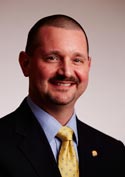
Thomas S. Roukis, DPM, PhD, FACFAS
ACFAS President
I have had many an evening meal with international colleagues discussing the “political” aspects of foot and ankle surgery in the U.S. Through these discussions, I have realized three things:
- First, although our degree may seem foreign to some, our training and education define who we are: Podiatric physicians by degree, but foot and ankle surgeons by post-graduate education and formal surgical training;
- Second, many great ACFAS members paved the way in these countries for other members and me to be readily accepted; and
- Finally, ACFAS’ reputation, especially in regards to our surgical skills courses and the Journal of Foot & Ankle Surgery, is known and respected worldwide.
Unfortunately, problems arise when foot and ankle surgeons represent themselves to the world, or worse, their patients, as something they are not. The dictionary defines a poseur as someone who pretends to be what he or she is not. Poseurs tend to suffer from a dangerous combination of arrogance and laziness. They are arrogant because they will not admit what they do not know how to do or simply cannot do; and they are lazy because they will not put in the necessary effort to learn what is needed to properly perform what they pretend to do.
This behavior becomes increasingly dangerous when applied to patient care. There are poseurs who thoroughly counsel patients on procedures that they themselves do not actually perform or have little knowledge of, as opposed to referring these patients for proper management of their health needs. The Hippocratic Corpus states the physician has two duties, namely “…to do good or to do no harm.” Understanding your limitations as a provider protects patients by doing no harm, and referring patients to an appropriate provider benefits them by affording access to necessary care. This is true patient-centric care.
The backbone of ACFAS is dissemination of our collective educational wisdom for the betterment of our patients. This is crystal clear from review of the first recorded objectives of the College: “To promote the art and science of foot surgery; to disseminate among its members, and the profession in general, all knowledge of foot surgery; to educate the public and students about foot surgery; and to encourage and maintain the highest professional standards among its members as they constantly strive to develop advanced techniques in foot surgery.” This purpose is devoid of arrogance and intolerant of laziness.
In context, I have always proposed that if you did not get the training in your residency/fellowship, or do not have sufficient clinical experience with a procedure, then you should enhance your skill set using any of the College’s many resources—be it in print, online or in-person. The strongest link in this education milieu is you, the ACFAS member. Interact with young members, be involved in your Regional Division, volunteer for a committee or sign up to peer review for the Journal of Foot & Ankle Surgery. I challenge you to give back to the College through sharing the legacy of learning that members of the College shared with you along your educational pathway.
I firmly believe that collectively we are a network of like-minded and authentic foot and ankle surgeons interested in one goal: bettering our patients’ lives in meaningful ways. To do this, we should not excuse or accept poseur behavior when we see it. Instead, we should remember to always represent all foot and ankle surgeons well by adhering to the highest standards of conduct as promoted by ACFAS as we are all judged by the actions and decorum of our members.
